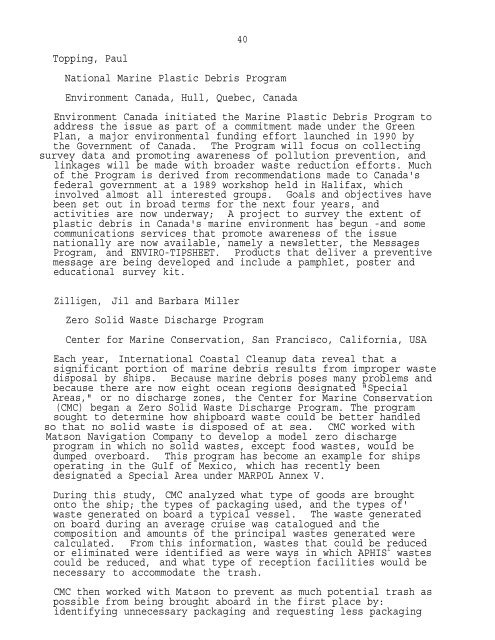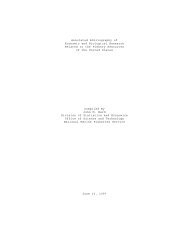Poster abstracts and manuscripts from the Third International ...
Poster abstracts and manuscripts from the Third International ...
Poster abstracts and manuscripts from the Third International ...
You also want an ePaper? Increase the reach of your titles
YUMPU automatically turns print PDFs into web optimized ePapers that Google loves.
Topping, Paul<br />
40<br />
National Marine Plastic Debris Program<br />
Environment Canada, Hull, Quebec, Canada<br />
Environment Canada initiated <strong>the</strong> Marine Plastic Debris Program to<br />
address <strong>the</strong> issue as part of a commitment made under <strong>the</strong> Green<br />
Plan, a major environmental funding effort launched in 1990 by<br />
<strong>the</strong> Government of Canada. The Program will focus on collecting<br />
survey data <strong>and</strong> promoting awareness of pollution prevention, <strong>and</strong><br />
linkages will be made with broader waste reduction efforts. Much<br />
of <strong>the</strong> Program is derived <strong>from</strong> recommendations made to Canada's<br />
federal government at a 1989 workshop held in Halifax, which<br />
involved almost all interested groups. Goals <strong>and</strong> objectives have<br />
been set out in broad terms for <strong>the</strong> next four years, <strong>and</strong><br />
activities are now underway; A project to survey <strong>the</strong> extent of<br />
plastic debris in Canada's marine environment has begun -<strong>and</strong> some<br />
communications services that promote awareness of <strong>the</strong> issue<br />
nationally are now available, namely a newsletter, <strong>the</strong> Messages<br />
Program, <strong>and</strong> ENVIRO-TIPSHEET. Products that deliver a preventive<br />
message are being developed <strong>and</strong> include a pamphlet, poster <strong>and</strong><br />
educational survey kit.<br />
Zilligen, Jil <strong>and</strong> Barbara Miller<br />
Zero Solid Waste Discharge Program<br />
Center for Marine Conservation, San Francisco, California, USA<br />
Each year, <strong>International</strong> Coastal Cleanup data reveal that a<br />
significant portion of marine debris results <strong>from</strong> improper waste<br />
disposal by ships. Because marine debris poses many problems <strong>and</strong><br />
because <strong>the</strong>re are now eight ocean regions designated "Special<br />
Areas," or no discharge zones, <strong>the</strong> Center for Marine Conservation<br />
(CMC) began a Zero Solid Waste Discharge Program. The program<br />
sought to determine how shipboard waste could be better h<strong>and</strong>led<br />
so that no solid waste is disposed of at sea. CMC worked with<br />
Matson Navigation Company to develop a model zero discharge<br />
program in which no solid wastes, except food wastes, would be<br />
dumped overboard. This program has become an example for ships<br />
operating in <strong>the</strong> Gulf of Mexico, which has recently been<br />
designated a Special Area under MARPOL Annex V.<br />
During this study, CMC analyzed what type of goods are brought<br />
onto <strong>the</strong> ship; <strong>the</strong> types of packaging used, <strong>and</strong> <strong>the</strong> types of'<br />
waste generated on board a typical vessel. The waste generated<br />
on board during an average cruise was catalogued <strong>and</strong> <strong>the</strong><br />
composition <strong>and</strong> amounts of <strong>the</strong> principal wastes generated were<br />
calculated. From this information, wastes that could be reduced<br />
or eliminated were identified as were ways in which APHIS l wastes<br />
could be reduced, <strong>and</strong> what type of reception facilities would be<br />
necessary to accommodate <strong>the</strong> trash.<br />
CMC <strong>the</strong>n worked with Matson to prevent as much potential trash as<br />
possible <strong>from</strong> being brought aboard in <strong>the</strong> first place by:<br />
identifying unnecessary packaging <strong>and</strong> requesting less packaging
















